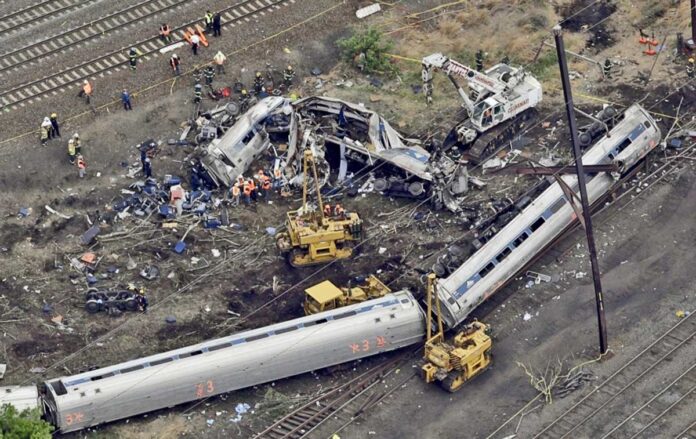Brandon W. Bostian, an openly gay train engineer who was involved in a deadly Amtrak train derailment in Philadelphia five years ago, continues his quest to avoid a criminal trial. On Aug. 11, his attorneys filed an 88-page petition with the state Supreme Court, asking that all charges against him be dismissed.
On May 12, 2015, eight people were killed and more than 200 were injured when an Amtrak train operated by Bostian derailed at the Frankford Curve in North Philadelphia.
Bostian was driving 106 mph in a 50 mph speed zone when the derailment occurred. Prosecutors allege that Bostian acted recklessly by “consciously disregarding a substantial and unjustifiable risk.” He’s charged with one count of risking a catastrophe, eight counts of involuntary manslaughter and 216 counts of reckless endangerment. Two lower courts have dismissed the charges, citing a lack of evidence. But three courts have reinstated the charges.
Most recently, a three judge panel of the state Superior Court reinstated criminal charges against Bostian. On May 14, 2020, Superior Court judges Victor P. Stabile, Correale F. Stevens and Megan McCarthy King ruled that prosecutors had introduced sufficient evidence to support criminal charges against Bostian.
Now, Bostian is asking the state Supreme Court to intervene and to order that all charges against him be dismissed. If his Aug. 11 petition is rejected, he will have to face a jury trial in Philadelphia Common Pleas Court.
Bostian’s Aug. 11 petition maintains that he was distracted by projectiles thrown at a nearby SEPTA train around the time of the derailment. The petition asserts that Bostian has been in “legal limbo” for five years, and that he shouldn’t be charged criminally for an accident. The petition slams the Superior Court for criminalizing “human error,” adding that Bostian tried to reduce his speed when approaching the curve, but it was too late to avoid derailment.
Bostian’s petition emphasizes that Superior Court “erred when it refused to consider evidence that in the moments before the accident, Mr. Bostian was made aware that [a SEPTA] train engineer had been struck by a projectile, and that news of this emergency caused him to lose situational awareness.”
In its May 2020 ruling, Superior Court said the SEPTA incident can be introduced as a defense theory during Bostian’s criminal trial as part of the fact-finding process.
“[Bostian’s] argument that he was distracted by the SEPTA incident involving a projectile and, as a result, lost situational awareness is improper at this juncture — as it is a defense theory that must be explored and litigated at trial,” Superior Court stated. “Whether [Bostian] lost situational awareness touches upon the weight and credibility of the evidence, which are non-factors at this stage of the proceeding.”
Brian J. McMonagle, an attorney for Bostian, declined to comment for this update.
In an prior email, he said: “We respectfully disagree with the Superior Court’s ruling that the undisputed truth that criminals were stoning passenger trains just before this accident should not have been considered by [lower courts]. We believe that it would have been unconscionable for [lower courts] to refuse to consider this evidence in evaluating whether the Commonwealth met its burden of proof.”
In court papers, prosecutors maintain the SEPTA incident cited by Bostian doesn’t excuse his alleged criminal conduct. They contend he should have oriented himself to his surroundings before manually increasing the throttle to 106 mph at the Frankford Curve, adding the train would likely have derailed if it were traveling 98 mph or more.
“[Bostian] exhibited a complete lack of vigilance where he ignored or failed to recognize numerous physical reference points that he was required to memorize in order to prevent the very type of catastrophe that occurred. When a train engineer fails to adhere to the applicable speed restrictions, disaster is virtually certain,” according to a prosecution filing.
Bostian, 37, remains free, pending the outcome of a possible trial. He couldn’t be reached for comment. The state Attorney General’s Office is prosecuting the case because the Philadelphia District Attorney’s Office declined to pursue the matter.
The state Attorney General’s Office issued this statement: “[Bostian’s petition] is a procedural development as the Office of the Attorney General moves forward in our work to deliver justice. The families who lost loved ones in this fateful crash and the many passengers who were injured deserve closure.”
Attorneys for the victims couldn’t be reached for comment. In a previous email, they wrote: “The victims of the Amtrak 188 tragedy welcome [the Superior Court] ruling that will, hopefully, lead to a jury trial, full accountability, and, ultimately, justice.”
Justin F. Robinette, a civil-rights attorney, said prosecutors should stop pursuing Bostian. “We know it’s a stretch to prosecute Mr. Bostian because two separate judges — and the DA’s Office when it initially reviewed the matter — concluded that no reasonable jury could find him guilty of a crime,” Robinette told PGN. “It’s only when well-known Philadelphia personal-injury firms got involved — and when publicity was brought to the matter — that a case was brought against Mr. Bostian. Our criminal justice system shouldn’t be run by mob mentality. At this point, I really feel prosecutors are harassing the gentleman. I hope the state Supreme Court steps in and puts a stop to it.”
Amtrak has taken responsibility for the crash, agreeing to pay $265 million to settle civil claims filed by victims and their families.
